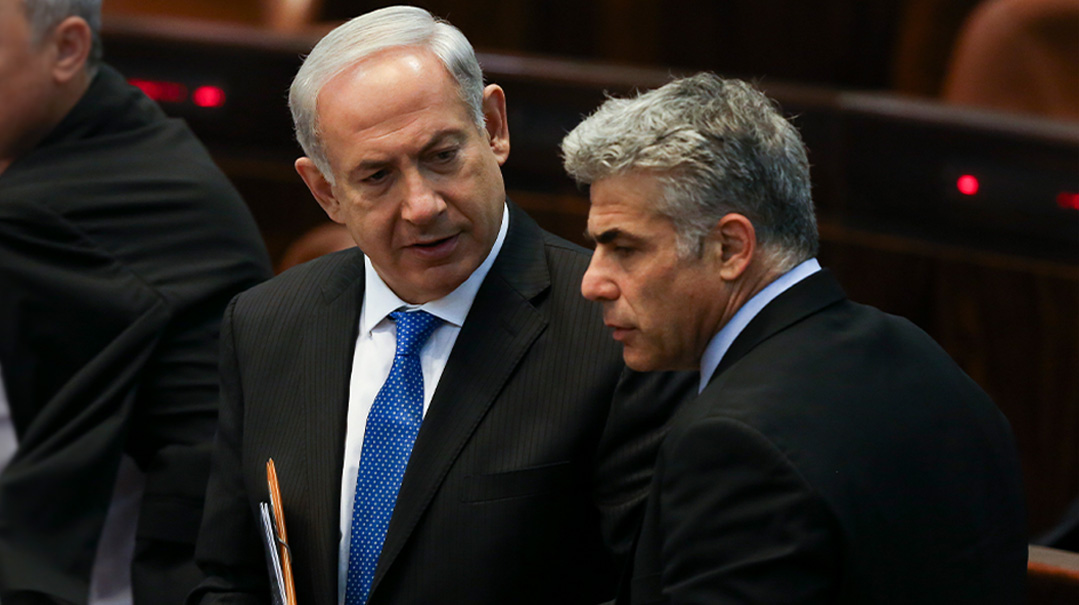5 Scenarios for the 5th Elections

For Bibi and Shaked, it's success or curtains

Albert Einstein probably never said the line often attributed to him: “The definition of insanity is repeating the same thing over and over again and expecting a different result.” But Einstein was genius enough to steer clear of Israeli politics, spurning an offer in 1952 to become president when Chaim Weizmann passed away. What would Einstein, or the person who did coin that axiom, say as Israel is about to hold its fifth election in three and a half years? Is there any chance the results will be different? Here is a quick preview of what could occur.
1. Bibi’s Last Lap
One doesn’t need an IQ of 150 to know that if the Likud falls short of the numbers required to form a stable coalition after the November 1 election, the party will serve Binyamin Netanyahu his walking papers, unless he is wise enough to quit first. To avoid that scenario, the Likud, and its three most like-minded partners — Shas, UTJ, and the Religious Zionists — must win 61 seats. That way, even if they reach out to build a broader coalition, it will be at their discretion, and they won’t fall prey to a small party that deems itself to be the kingmaker.
In the current Knesset, these four parties control just 52 seats. The most optimistic polls show this bloc winning 59 or 60 seats in November. That’s not enough, and that’s been the problem in the last four elections. Where can the extra seats come from?
2. Ayelet Shaked: Sink or Swim
Once Naftali Bennett erased his red lines and cast his lot with Meretz and the Arabs, he left his longstanding political ally — Ayelet Shaked — out to dry. Bennett is going into self-imposed retirement, at least for the upcoming election, and after several defections, Bennett’s Yamina party has been gutted.
It takes at least 140,000 votes to win the 3.25% to cross the threshold and enter the Knesset with a minimum of four seats. Does Ayelet Shaked have enough star power to rebuild the party by November? Shaked has demonstrated talent and tenacity in heading both the justice and interior ministries, but she has never led a political party. Considering Yamina MKs have been deserting the party’s sinking ship for months now, she will have to shuffle the decks to field a new — and loyal — slate of candidates for a discredited party.
3. Yair Lapid’s Rising Tide
Unlike Bennett, his erstwhile coalition partner turned political chameleon, with Lapid, what you see is what you get. Lapid has been called shallow, vain, a limousine liberal, and a demagogue. But he has polished his image and toned down his anti-chareidi rhetoric in his ten years in the Knesset, knowing that one day, he might have to sit in a coalition with the chareidi parties. Lapid has bolstered his résumé with stints as both finance and foreign minister.
Don’t underestimate the prestige that the title of caretaker prime minister will convey. Next week, Lapid will get another publicity boost when he hosts US president Joe Biden. Criticized for making Yad Vashem his first stop as prime minister instead of the traditional Kosel venue, Lapid made amends in his first official speech Motzaei Shabbos, remarking that Israel’s “establishment didn’t begin in 1948, but rather on the day Joshua crossed the Jordan and forever connected the people of Israel with the land of Israel.”
While that’s a given to believing Jews, it’s a nuanced point often lost on the international community, who hold that Israel’s borders are man-made and can therefore be unmade by man. Lapid is a proven vote-getter, winning 614,000 votes in the last election and more than 1 million when he ran together with Blue and White. The Israeli media is already gushing over him, and if he enjoys even a modicum of success in his stint as prime minister, he could become November’s upside surprise.
4. Chareidim Tread Water
Chareidim survived the last year outside the coalition with a minimum of damage to their interests. No new draconian draft law was passed, and cuts to chareidi families for day care were thwarted by the High Court and the outgoing government’s failure to pass a budget for 2023. Kashrus and conversion reforms are stalled. The biggest complaint among chareidi consumers is the onerous tax on paper and plastic products levied by Finance Minister Avigdor Lieberman that takes a large bite out of household budgets.
But the chareidim need to be in the next coalition to preserve their way of life. The major question is whether the two factions that comprise UTJ will run separately. Some leaders in both the Degel HaTorah (“litvish”) faction and the Agudas Yisrael (chassidic) faction believe running on separate slates would energize voters who feel that power-sharing arrangements between the two factions leave both sides feeling underrepresented and unfulfilled.
Shas also has a major decision to make. Aryeh Deri resigned from the Knesset as a part of a plea bargain, but he is entitled to run in November. Will he grab the reins as head of Shas’s Knesset slate, or remain party leader from the outside?
Either way, the chareidi parties must find a way, and fast, to win back the 63,000 voters who deserted them between the third and fourth elections, and then motivate all of the youths who just turned 18 in the last couple of elections to vote. The demographics support higher chareidi Knesset representation, but the sense of urgency seems to be missing.
5. In Muddy Waters
There are certain to be some party mergers and realignment between now and the September 15 deadline to submit final party slates. The experiment with the Arab party — Ra’am — is probably over. A center-right government will not be able to rescind the multiyear NIS 50 billion package given to the Arab sector without sparking major riots, but that doesn’t mean Ra’am needs to be in the coalition.
Keep the Religious Zionist camp under your political microscope. Some polls show the party headed by Bezalel Smotrich gaining four seats, from seven to 11. However, they too are composed of many factions. The one headed by Itamar Ben-Gvir applied at Sunday’s midnight deadline to split from Smotrich, for technical reasons. They might reunite before the election, but there is no guarantee Smotrich and Ben-Gvir will agree to glue them back together. Splits among religious Zionists in previous elections have cost them seats.
Will New Hope (Gideon Saar) merge with Blue and White (Benny Gantz)? Saar may not make the cut otherwise. Gantz is also the weakest link in the anti-Bibi camp, but if he and Saar merge, they could win 10 to 12 seats, and that would harden their anyone-but-Bibi stances.
The Likud might try to aggressively woo Avigdor Lieberman’s right-wing Russian constituents in Yisrael Beiteinu. The Likud usually avoids a frontal confrontation with Lieberman because they view him as a potential coalition partner, but after four elections in which Lieberman has said nyet to Bibi and the chareidim, the Likud needs to wise up and compete for one of few pools of voters who share a very similar political ideology.
(Originally featured in Mishpacha, Issue 918)
Oops! We could not locate your form.







